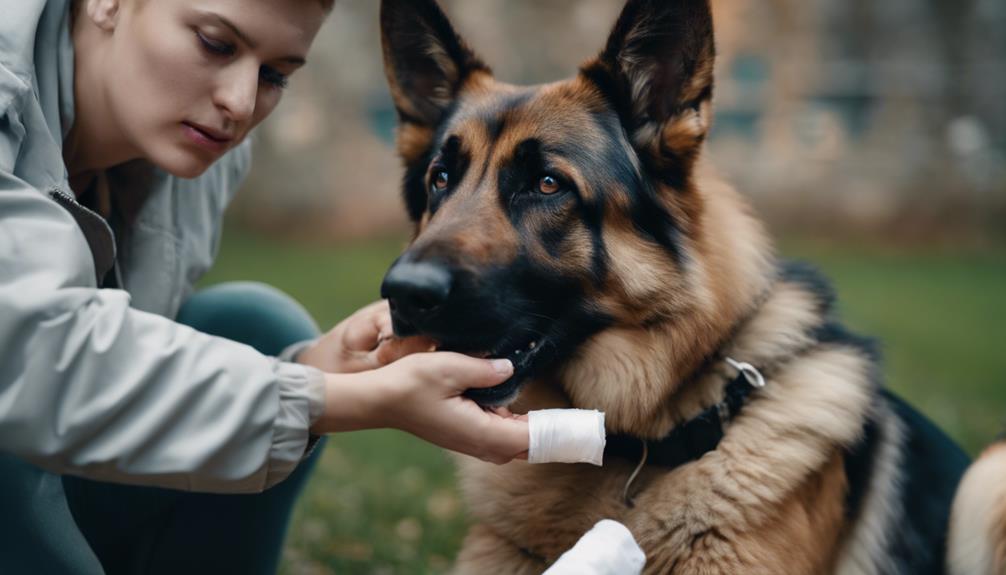🐾 Paw-some Partnership Alert! 🐾
As a pack of German Shepherd enthusiasts at MixGermanShepherd.com, we're always sniffing out the best products for our furry friends. Guess what? When you fetch something from Amazon through our links, we earn a little treat! 🦴
When it comes to your German Shepherd mix, having a few first aid tricks up your sleeve is like having a safety net for your four-legged friend. But what if a sudden emergency strikes and your furry companion needs immediate help? You'll want to be prepared with essential skills to navigate through challenging situations. From recognizing signs of distress to handling common health issues, let's dive into practical tips that can make a real difference in safeguarding your pup's well-being.
Key Takeaways
- Recognize common health issues like hip dysplasia and bloat in German Shepherd mixes.
- Be prepared to handle wounds with proper cleansing, monitoring, and antiseptics.
- Deal effectively with insect bites using cold compresses and veterinary consultation.
- Learn preventive measures for emergencies like heat exhaustion and basic CPR for dogs.
Common Health Issues to Watch for
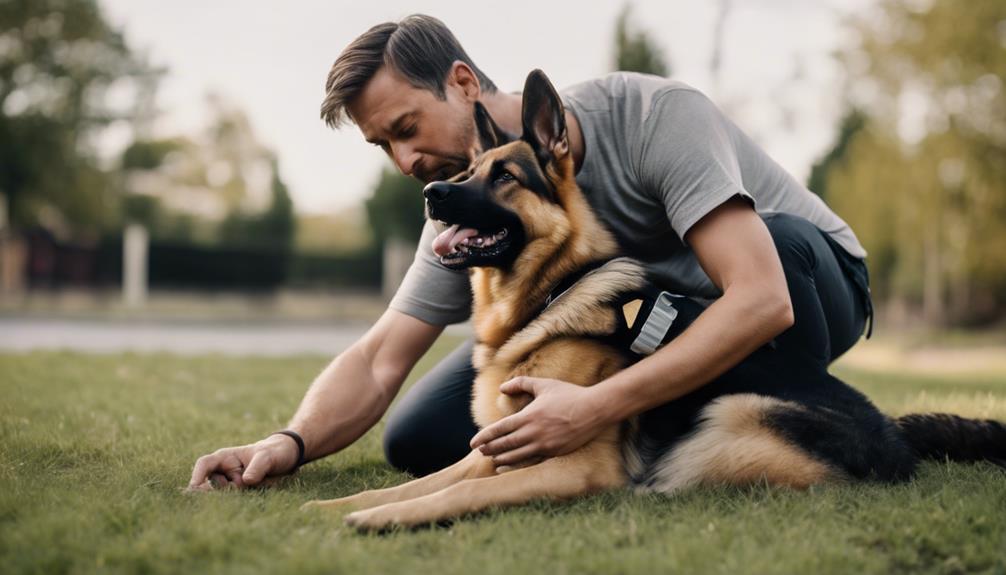
When caring for a German Shepherd mix, vigilance against potential health issues is crucial for their overall well-being. German Shepherds and their mixes may be prone to various health conditions that require careful monitoring. One common issue to watch for is hip dysplasia, an inherited condition affecting the hip joints. This can lead to discomfort and mobility issues in your furry companion. Additionally, degenerative myelopathy, a neurological disease that affects the spinal cord, is another concern for German Shepherds and their mixes. Keep an eye out for symptoms such as weakness in the hind legs. Bloat, a serious condition that can affect deep-chested breeds like German Shepherds, including mixes, should also be on your radar. Regularly checking for skin problems like hot spots or allergies is essential, as these are common in this breed. Lastly, digestive issues such as sensitive stomachs or food allergies can impact the well-being of your German Shepherd mix, so be mindful of any signs of distress in this area.
Recognizing Signs of Distress
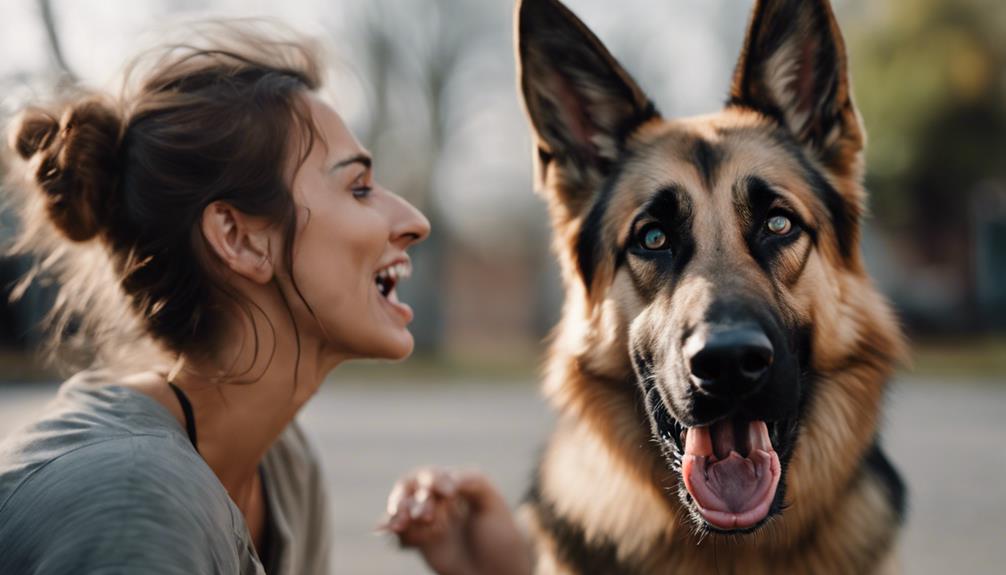
To effectively care for your German Shepherd mix, it is crucial to be able to recognize signs of distress promptly. Being attentive to your pet's behavior and physical cues can help you address any issues early on. Here are some signs of distress to watch out for in your German Shepherd mix:
- Excessive Panting, Drooling, Restlessness, or Pacing: These could indicate discomfort or anxiety in your German Shepherd mix.
- Signs of Pain: Whimpering, yelping, or guarding a specific body part may signal your German Shepherd mix is in pain and distress.
- Behavioral Changes: Aggression, fearfulness, or withdrawal could be signs of distress in your German Shepherd mix.
- Abnormal Symptoms: Vomiting, diarrhea, lethargy, or difficulty breathing should be monitored as they may indicate distress in your German Shepherd mix.
Handling Cuts and Wounds
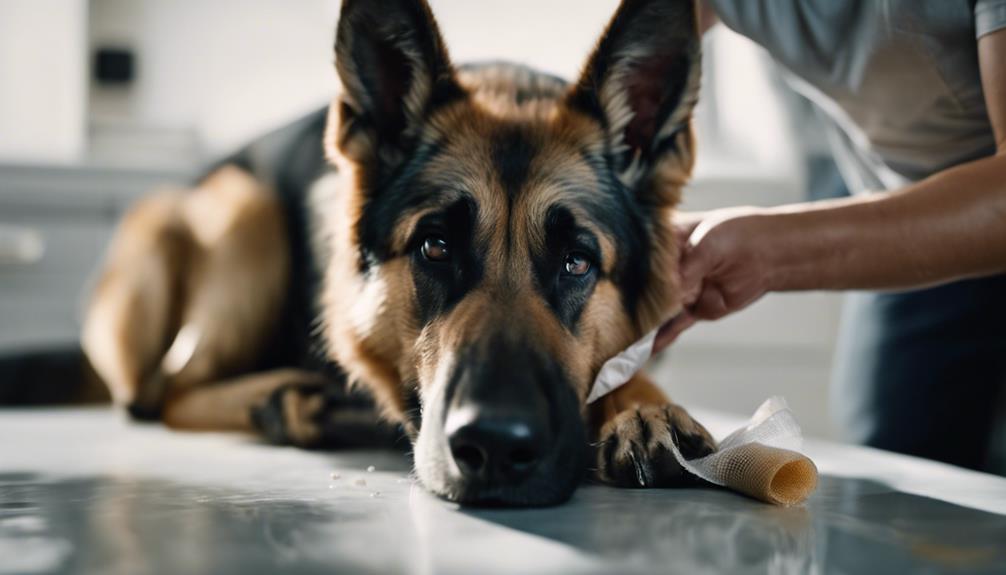
When tending to cuts and wounds on your German Shepherd mix, remember to cleanse the wound with saline solution to prevent infections. Apply pressure using sterile gauze to stop bleeding effectively. Monitor the wound for signs of infection and ensure proper first aid to aid in healing.
Cleaning the Wound
To properly care for your German Shepherd mix's cuts and wounds, start by cleaning the affected area with mild soap and water to eliminate dirt and debris. Remember to handle this with care to prevent any potential infections. Here are some essential tips for cleaning the wound:
- Use a sterile gauze pad or cloth to gently pat the wound dry after cleaning to prevent infection.
- Avoid using alcohol or hydrogen peroxide on wounds, as they can delay healing and damage healthy tissue.
- Apply a pet-safe antiseptic or antibiotic ointment to the wound to promote healing and prevent infection.
- Monitor the wound for any signs of redness, swelling, or discharge, and consult a vet if you notice any concerning changes.
Taking these steps will help ensure your furry friend's wound heals properly.
Applying First Aid
For effective first aid when handling cuts and wounds on your German Shepherd mix, begin by cleaning the affected area with saline solution to prevent infection. Use gentle pressure with sterile gauze to control any bleeding. It's crucial to avoid using alcohol or hydrogen peroxide on the wound as these can be harmful. Once the wound is clean, cover it with a clean bandage to protect it from your German Shepherd's licking, which could introduce bacteria. Remember, seeking a vet assessment for all cuts and wounds is essential to ensure proper treatment and prevent any complications. By following these steps, you can help your German Shepherd mix heal effectively and stay healthy.
Monitoring for Infection
As you continue caring for cuts and wounds on your German Shepherd mix, vigilantly monitor for any signs of infection, such as redness, swelling, pus, or warmth around the affected area.
- Keep the wound clean and dry to prevent bacterial growth and infection in your pet.
- Watch for increased pain, sensitivity, or changes in behavior that could indicate an infection developing.
- Seek veterinary attention if you notice any signs of infection to prevent complications and ensure proper healing.
- Regularly check the wound for any discharge, foul odor, or delayed healing, as these can be indicators of infection.
Taking these steps will help you detect and address any potential infections early, ensuring your German Shepherd mix stays healthy and heals properly.
Dealing With Insect Bites
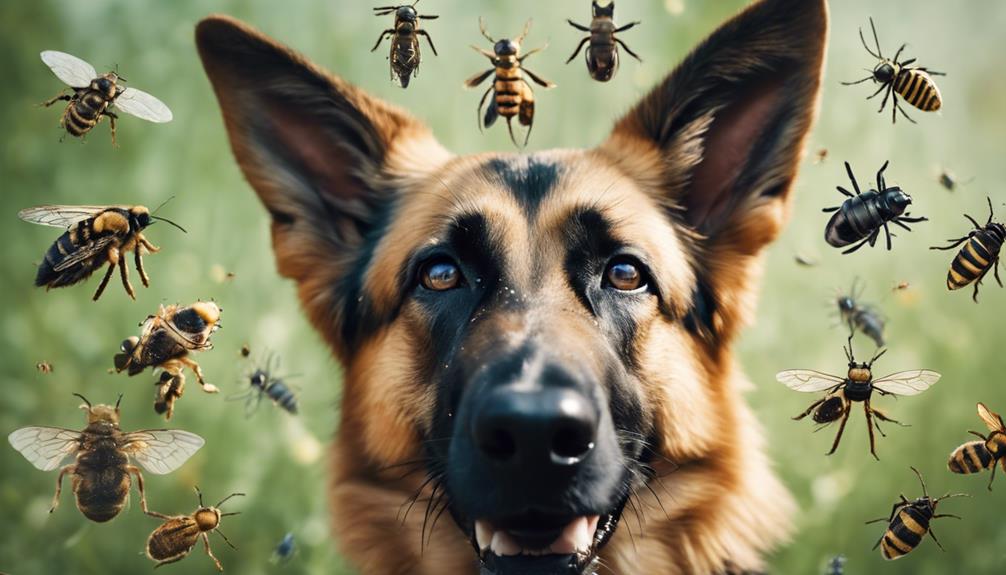
If your German Shepherd Mix is suffering from an insect bite, it's crucial to recognize the symptoms, which may include redness, swelling, itching, and pain at the bite site. Apply a cold compress to help alleviate swelling and discomfort, but be vigilant for signs of severe reactions such as difficulty breathing or facial swelling. Remember, prompt veterinary care is essential if your pet shows signs of an allergic reaction to an insect bite for proper treatment.
Identifying Insect Bite Symptoms
When your German Shepherd mix experiences an insect bite, be vigilant for symptoms such as redness, swelling, and itchiness at the bite site.
- Look out for signs of allergic reactions like hives, difficulty breathing, or excessive drooling after an insect bite.
- Common insects that may bite German Shepherds include mosquitoes, fleas, ticks, and spiders.
- Immediate treatment for insect bites on German Shepherds includes cleaning the area, applying ice packs, and monitoring for any worsening symptoms.
- Severe reactions to insect bites, like anaphylaxis, require immediate veterinary attention for German Shepherds.
Being aware of these symptoms and taking prompt action can help ensure the well-being of your beloved German Shepherd mix.
Treating Insect Bites
To effectively treat insect bites on your German Shepherd Mix, begin by monitoring for common symptoms such as swelling, redness, and itching. If you notice any signs of insect bites, use a cold compress or ice pack wrapped in a towel to reduce inflammation and soothe the affected area. It's important not to use human insect bite creams on your pet, as they may contain ingredients that could be harmful. Should the insect bite show signs of infection or your pet display unusual symptoms like lethargy or loss of appetite, consult your veterinarian promptly. Additionally, to prevent future insect bites, consider using pet-safe insect repellents and keeping your German Shepherd Mix away from areas known to harbor insects. Your pet's health and well-being are a top priority, so always take proper care when treating insect bites.
First Aid for Heat Exhaustion
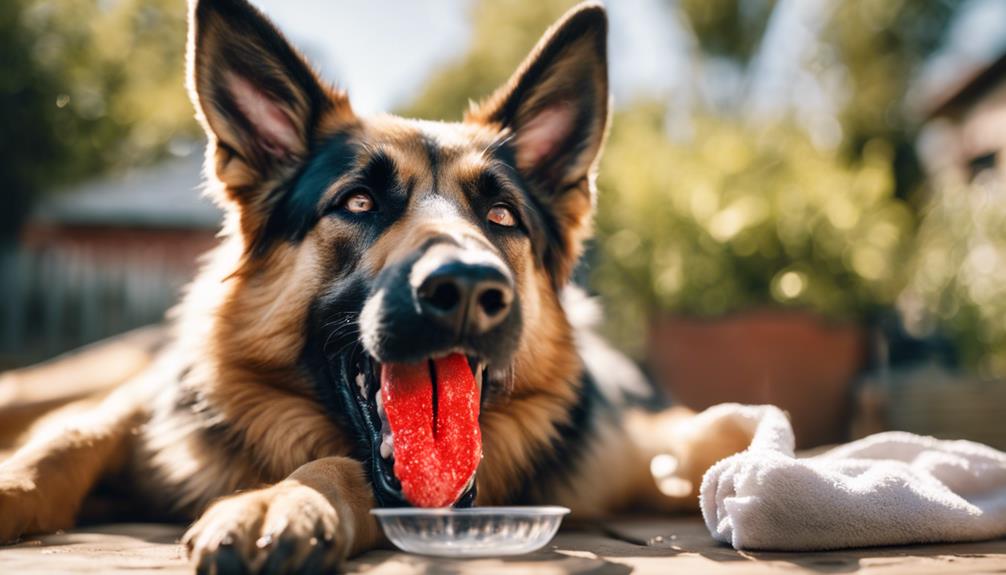
At the first signs of heat exhaustion in your German Shepherd mix, prioritize moving the dog to a cool, shaded area immediately. Heat exhaustion can manifest through symptoms like excessive panting, drooling, weakness, and potential collapse. To assist your furry companion effectively, consider the following steps:
- Provide Water: Offer small amounts of water for your dog to drink. Hydration is crucial in helping them recover from heat exhaustion.
- Cool Compress: Use cool, wet towels on their body to help lower their temperature gradually. Avoid using ice-cold water or ice packs directly on the skin to prevent shock.
- Monitor Closely: Keep a close eye on your dog's condition. If the symptoms persist or worsen, seek veterinary attention promptly.
- Preventive Measures: Take precautions to avoid heat exhaustion in the future by ensuring your dog has access to shade and water, especially during hot weather.
CPR Basics for Dogs
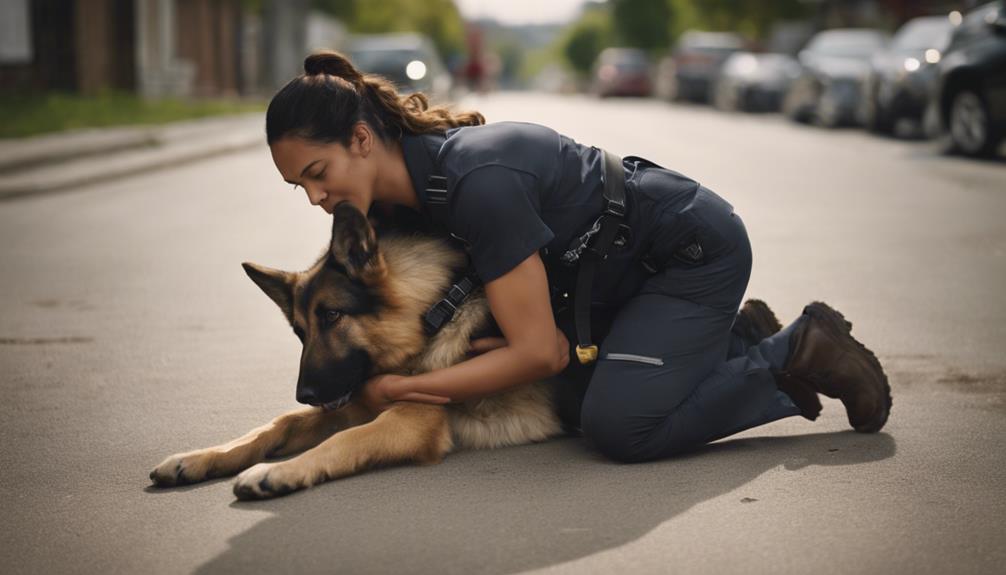
If your German Shepherd mix experiences a cardiac emergency, knowing the basics of CPR for dogs can be crucial in potentially saving their life. CPR for dogs involves a combination of chest compressions and rescue breaths to assist a pet in cardiac arrest. The correct ratio to follow during dog CPR is 30 chest compressions to 2 rescue breaths. To effectively perform chest compressions, locate the heart on the left side of the chest behind the elbow. Before initiating CPR, check for a heartbeat or pulse, and continue the procedure until the pet shows signs of recovery or until you can get them to a vet.
For pet owners interested in learning proper CPR techniques for dogs, there are training courses available specifically tailored to handle such emergency situations. Being equipped with the knowledge and skills of dog CPR can make a significant difference in critical moments. Remember, quick and appropriate action during a cardiac emergency can help increase the chances of your pet's survival.
Managing Poisoning Emergencies
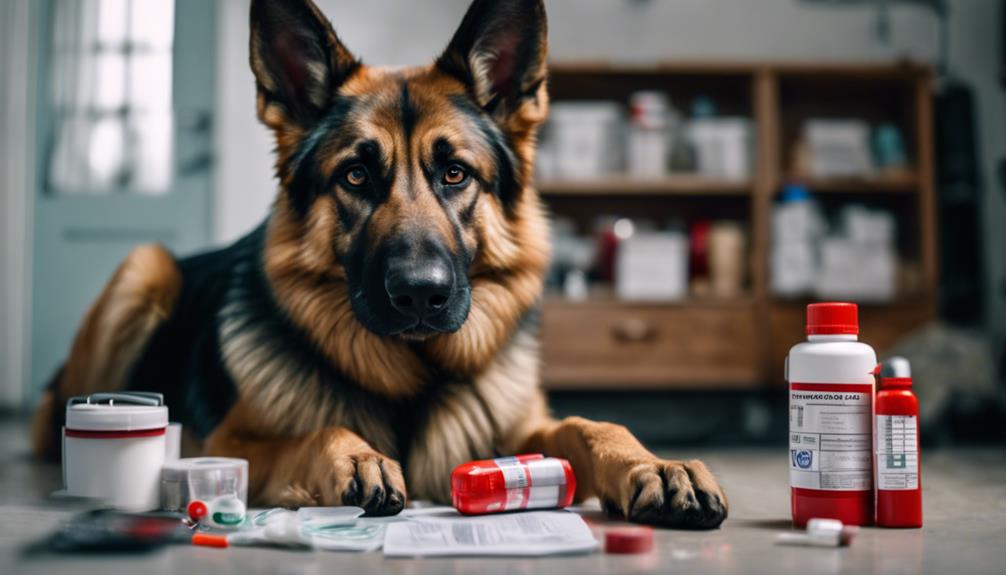
If your German Shepherd mix shows signs of poisoning, it's crucial to act fast. Common toxins to avoid, recognizing symptoms quickly, and taking immediate steps can make a significant difference in your dog's recovery. Remember, always seek professional help when dealing with poisoning emergencies to ensure the best outcome for your furry friend.
Common Toxins to Avoid
When it comes to ensuring the well-being of your German Shepherd mix, being aware of common toxins to avoid is crucial, especially in managing poisoning emergencies. Remember that prevention is key to keeping your furry friend safe. Here are some common toxins you should steer clear of:
- Chocolate
- Xylitol
- Grapes and raisins
- Certain plants like lilies and azaleas
Being mindful of these items can help prevent accidental ingestion and potential poisoning incidents. In case of an emergency, contact the ASPCA Pet Poison Hotline or seek immediate veterinary care. Your quick actions can make a significant difference in ensuring the health and safety of your beloved German Shepherd mix.
Recognizing Symptoms Quickly
To safeguard your German Shepherd mix's well-being, promptly recognizing symptoms of poisoning like vomiting, diarrhea, weakness, and seizures is crucial for managing poisoning emergencies effectively. If you notice your dog vomiting frequently, exhibiting diarrhea, seeming unusually weak, or experiencing seizures, it could indicate poisoning. Acting swiftly in such situations can make a significant difference in your pet's recovery. Remember that immediate veterinary care is essential in poisoning emergencies to prevent serious complications. Common household poisons for dogs include chocolate, grapes, raisins, xylitol, and certain medications. Keep the ASPCA Pet Poison Hotline number (888-426-4435) handy for quick assistance in poisoning cases. Always consult a professional before inducing vomiting, as it can worsen the situation in some poisoning cases.
Immediate Steps to Take
In a poisoning emergency with your German Shepherd mix, promptly contacting a vet or the ASPCA Pet Poison Hotline is crucial for ensuring quick and appropriate care. Immediate steps to take include:
- Contact a Professional: Reach out to a veterinarian or the ASPCA Pet Poison Hotline right away if poisoning is suspected.
- Avoid Inducing Vomiting: Refrain from inducing vomiting without veterinary instruction in cases of poisoning.
- Use Hydrogen Peroxide: Only administer 3% hydrogen peroxide to induce vomiting if advised by a vet after ingestion of a toxic substance.
- Seek Veterinary Care: Take your German Shepherd mix to the vet promptly for proper treatment to prevent serious health complications.
Treating Burns and Scalds
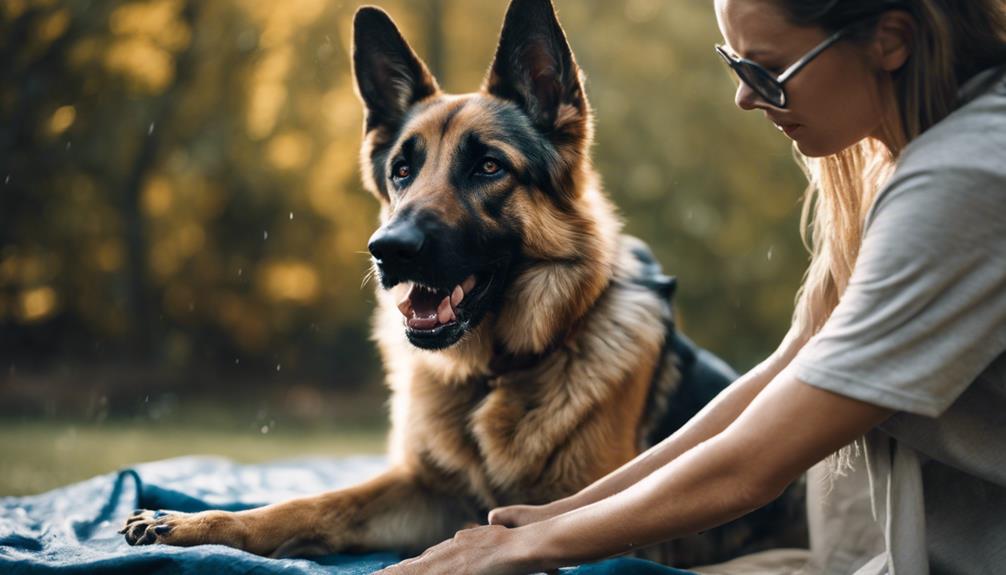
Treating burns and scalds requires immediate cooling with cold water for a minimum of 10 minutes to prevent further tissue damage. Remember not to use ice, ointments, or butter on burns as they can exacerbate the injury. After cooling the affected area, cover it with a sterile, non-adhesive bandage to shield it from potential contamination. It is crucial to seek veterinary care for severe burns or scalds, especially if the skin shows signs of blistering or charring. Keep a close eye on your German Shepherd mix for indications of shock, like pale gums, a rapid heartbeat, or shallow breathing. If you notice any of these signs, seek immediate veterinary attention to ensure your furry friend receives the necessary care.
| Dos | Don'ts |
|---|---|
| Cool burn with cold water for 10 min | Apply ice, ointments, or butter |
| Cover with sterile bandage | Leave burn exposed |
| Seek veterinary care for severe burns | Ignore signs of shock and delay treatment |
Steps for Fracture Care
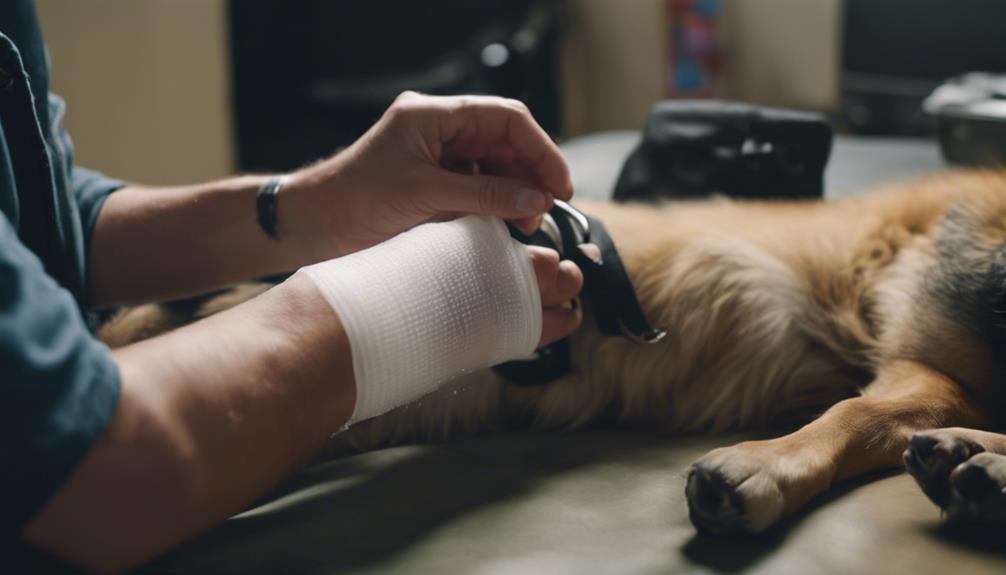
Following the immediate care for burns and scalds, the next crucial step is understanding the steps for fracture care to effectively support your German Shepherd mix's recovery. When dealing with a fracture, it's essential to take the following steps:
- Apply a splint: Stabilize the fracture by applying a splint to prevent further movement and aid in the healing process.
- Use padding: Ensure to use padding around the splint to provide cushioning and support to the affected limb.
- Monitor for signs: Keep a close eye on the affected limb for any swelling, discoloration, or signs of infection, and seek veterinary advice if these occur.
- Restrict movement: Keep your dog calm and restrict their movement to prevent aggravating the fracture further.
Handling Choking Incidents
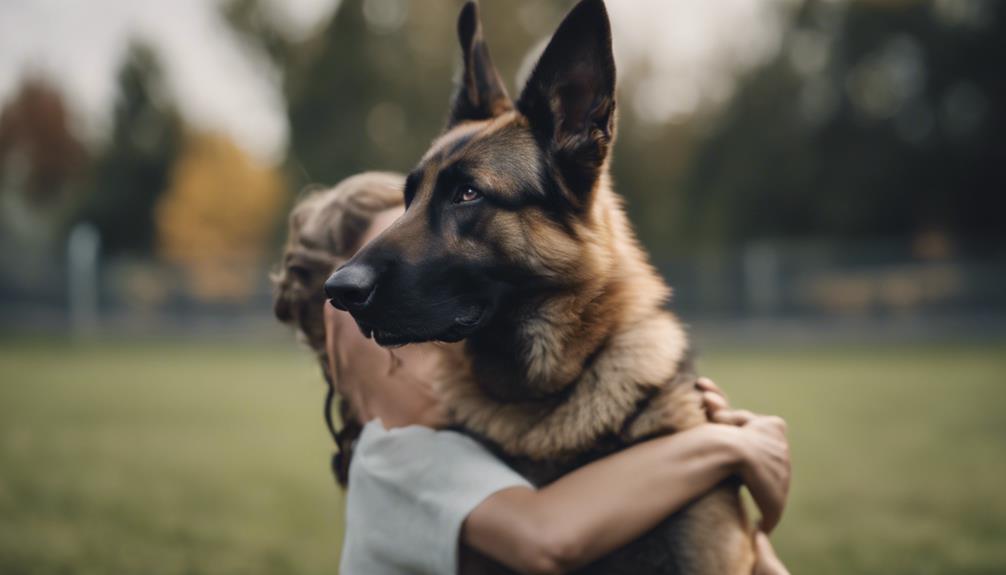
When faced with a choking incident involving your German Shepherd mix, promptly lift their muzzle to open the mouth and ensure the nostrils are unobstructed. It's crucial to act calmly and swiftly in these situations. If you can see the object causing the choking and your pet is still able to breathe, carefully use needle-nose pliers to remove it. However, if the object remains lodged, lay your pet on their side and apply pressure at the rib cage end to assist in dislodging the obstruction. Should the choking object persist and your pet becomes unconscious, perform CPR until you can get them to a vet. Remember, immediate veterinary attention is necessary if your German Shepherd mix ingests something toxic or remains unresponsive after a choking incident. Your quick and appropriate actions can make a significant difference in helping your beloved pet through choking incidents.
Preparing a Pet First Aid Kit
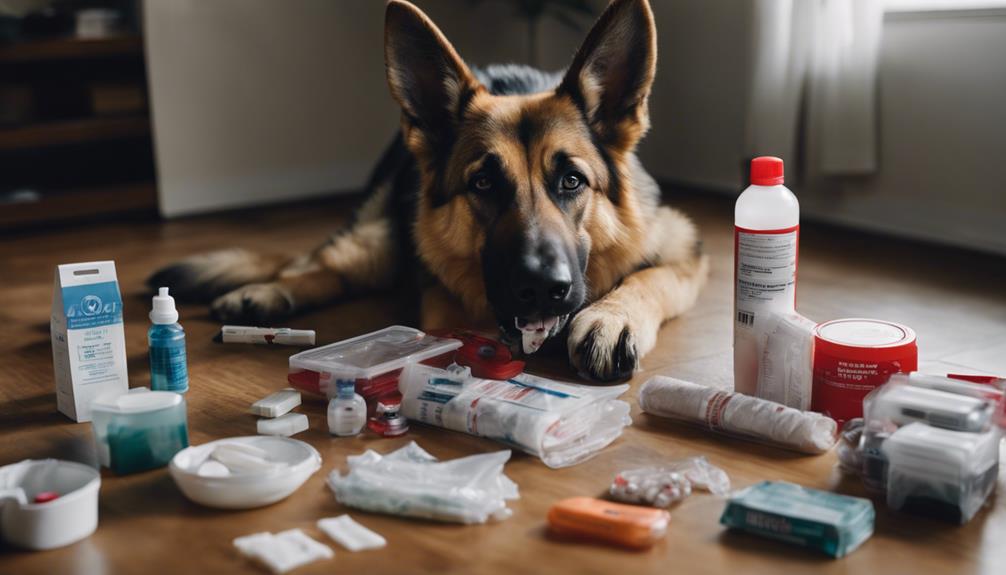
In preparing a pet first aid kit for your German Shepherd mix, ensure it includes essential supplies like bandages, gauze, and antiseptic wipes. Being prepared can make all the difference in handling emergencies effectively. Here are some key items to consider including:
- Pet-Safe Thermometer: To monitor your pet's temperature in case of illness or injury.
- Hydrogen Peroxide: For cleaning wounds and inducing vomiting under veterinary guidance.
- Styptic Powder: To stop bleeding from minor cuts or broken nails.
- Pet First Aid Manual: Provides guidance on how to handle common pet emergencies.
Frequently Asked Questions
How Do You Take Care of a German Shepherd Mix?
To take care of a German Shepherd mix, focus on tailored training techniques, exercise, and socialization. Consistency, positive reinforcement, and understanding their unique needs are vital. Grooming, nutrition, and health care should be personalized for their well-being.
How Do You Protect Yourself From a German Shepherd?
To protect yourself from a German Shepherd, use positive reinforcement training techniques. Understand their body language, avoid sudden movements, and provide mental stimulation. Always supervise interactions with strangers. By building trust, you create a safe environment.
What Not to Do to a German Shepherd?
When interacting with a German Shepherd, avoid harsh methods. Instead, focus on proper socialization. Treat them with kindness to build trust and avoid negative behaviors. Engage in positive training techniques to foster a strong bond.
What Every German Shepherd Owner Should Know?
So, you want to know what every German Shepherd owner should know? Well, start with effective training methods. Understanding your pup's behavior and needs is crucial. Get ready for a rewarding journey ahead!
Conclusion
In conclusion, being a German Shepherd mix owner comes with the responsibility of knowing how to handle various emergencies that may arise. By being prepared, staying informed, and seeking professional help when needed, you can ensure the safety and well-being of your furry companion. Remember, it's better to be over-prepared than under-prepared when it comes to your pet's health and safety. Stay vigilant, stay informed, and always prioritize your pet's well-being.
